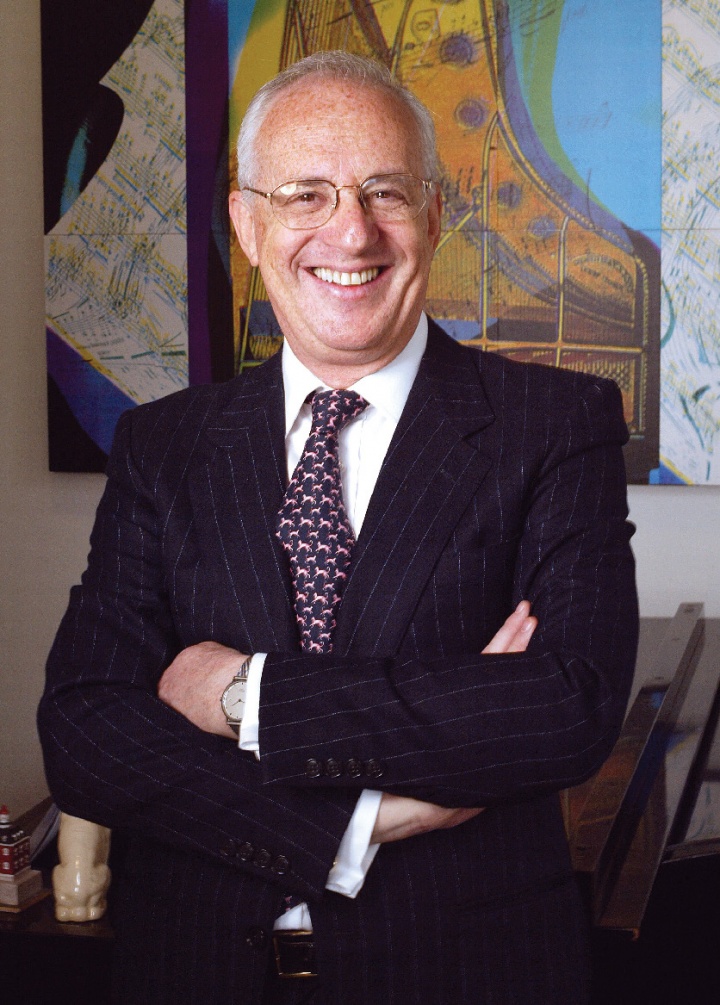Columbia College | Columbia University in the City of New York
Peter Thall ’64’s Advice Is Music to the Industry’s Ears
It was on attorney Peter Thall ’64’s living room floor that Daryl Hall and John Oates hashed out the song “Had I Known You Better Then.” Oates strummed away as Thall made the budding rock stars dinner — steak and peas, Thall recalled. His attentiveness to musicians like Hall and Oates also is evident in the recently released, third edition of his book, What They’ll Never Tell You About The Music Business. In the book, and across his 40-year career representing creators from The Cars to Barry Manilow to ABBA, Thall provides the kind of nourishing wisdom that allows artists to focus on the creativity their work requires.

VINCENT LAFORET
“From the beginning, I began to care about my clients not only as a lawyer, but also as someone who could train them to understand the complexities forced upon them by the music business,” he says. “It is a privilege for me to help them accomplish this.”
Thall’s near-paternal concern for the artists he represents is seeded in personal experience. Before even graduating from high school, the Connecticut native had written a hit — and been sued for copyright infringement. It was a musical of the Gettysburg Address, performed by members of the local Coast Guard. But Thall was sued by a man who claimed he held the rights to Lincoln’s words and that Thall’s song was an infringement. To anyone else, the suit might have been an ugly foray into the adult world. But Thall was fascinated. His civics class attended the trial. While he was a College student, the case had already made its way into the Second Circuit Court of Appeals. He won the case, and with it, a direction for his life.
“I wanted to be a lawyer, and I found an area of law that combined my interest in music and law — and copyright, by that point,” he says. “So that’s how I became interested in representing creators.”
At Columbia, Thall studied American government. In 1967, he graduated from The George Washington University Law School, one of the few law schools at that time with a copyright specialty. Upon graduating, he worked with the general counsel at the American Society of Composers, Authors and Publishers, then with small firms throughout his 20s, helping represent musicians like Paul Simon, Art Garfunkel ’65 and Miles Davis. In 1977, he formed his own firm, Levine & Thall, in New York City. Thall specialized in music law while his partner took on theater law; others at the firm handled publishing, film and television. “We represented all aspects of entertainment law,” Thall says. “There was a lot of synergy.”
Thall co-wrote a James Bond theme with a successful lyricist, but jokes, “Alas, they preferred Sheryl Crow’s offering to mine. So disappointing.”
One day, while Thall’s partner dealt with a client’s Broadway plays, Thall handled the same client’s negotiations with Disney and Dreamworks for his soundtracks to Pocahontas and The Prince of Egypt. The client happened to be in the office when an opportunity arose to showcase material to a London director and producer. The client presented his musical on Thall’s in-office Steinway. “I will never forget the sounds from the piano ringing throughout the law firm even as a new and exciting matter requiring legal services was actually being created down the hall,” he says.
Thall maintained relationships with his musician clients. He continues to sing and compose songs, sometimes with clients. He co-wrote a James Bond theme with a successful lyricist, but jokes, “Alas, they preferred Sheryl Crow’s offering to mine. So disappointing.”
Thall takes a proactive approach to the music business, always trying to teach musicians to fend for themselves and to know the laws that could help or hurt them. While the presumption is that his readers are professionals who can afford managers, accountants and attorneys, he hopes the book serves as some less expensive expert advice.
And the industry agrees. David Renzer, who once oversaw the largest music publishing company in the world, Universal Music Group, and now chairs Spirit Music Group, says Thall’s experience gives him a unique perspective on the business. “He has seen our industry evolve through being on the front lines of the digital revolution and its impact on both artists and companies.”
Thall’s book closes with a speech he gave at the University of Hamburg in 2011, around the time when the music industry was grappling with a new wave of piracy. He compared the situation to the myth of Medea, which he studied at the College. Medea is driven by passion to kill her children. Likewise, those who downloaded music illegally were driven by a passion for the music that defined their culture, Thall said. Understanding industry phenomena with the help of things like classic Greek mythology are one of the ways Thall has been able to adapt his knowledge to the current climate in the music world.
“Nothing brings out passion more than music. And the industry executives, many of whom are not musicians ... had no understanding of the emotions and the character of their audience,” he says. “Functioning in my industry, I pretty much had to select a side, if you will. And the side that I chose was that of the creator.”
Lauren Steussy is a reporter based in Brooklyn. Her last CCT profile was on music critic Ben Ratliff ’90 (Summer 2016). Steussy’s work has also appeared in Marie Claire, the Staten Island Advance and the Columbia Journalism Review, and on Cosmopolitan.com.
Issue Contents
Published three times a year by Columbia College for alumni, students, faculty, parents and friends.
Columbia Alumni Center
622 W. 113th St., MC 4530, 6th Fl.
New York, NY 10025
212-851-7852
cct@columbia.edu
Columbia Alumni Center
622 W. 113th St., MC 4530, 4th Fl.
New York, NY 10025
212-851-7488
ccalumni@columbia.edu

